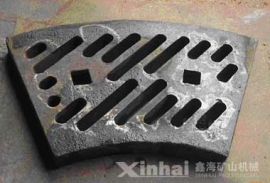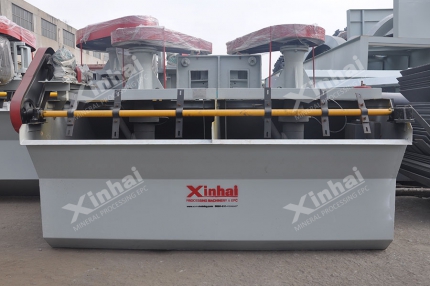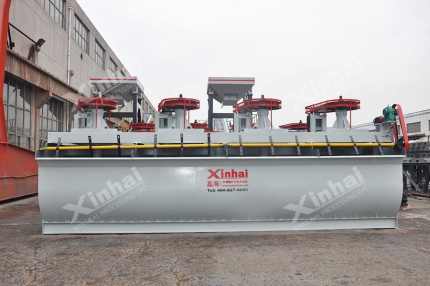In the processing of steel smelting, the main harmful elements are phosphorus and sulfur. The phosphorus and sulfur in ores enter sinter and pig iron in the sintering and blast furnace smelting process, which influences the quality of pig iron products. If the content of phosphorus and sulfur is over a certain amount, the mechanical behavior of pig products would be influenced. Therefore, phosphorus and sulfur need to be removed in the iron ore processing stage.

Use the table of contents below to navigate through the guide:
01Iron Ore Desulfurization Processing
Stage grinding – stage processing desulfurization
The grinding fineness has a large influence on pyrite-bearing iron ore beneficiation. Different grinding fineness influences the dissociation degree of mineral monomer and washability. When the inlaid granularity of iron is fine, fine grinding is needed to reach the dissociation degree of the iron monomer. Therefore, fine inlay single iron ore with fine particle size and sulfur-containing type, such as iron pyrite and pyrrhotite, usually applies stage grinding – stage processing technology to reach the aim of reducing sulfur content.

Magnetic separation – flotation combined desulfurization
At present, there is a large amount of pyrrhotite and iron pyrite in selected magnetite. Magnetic agglomeration easily happens during processing, which causes a serious negative impact. The single magnetic process is hard to obtain high-grade concentrates. If the magnetic separation and verse flotation are combined to separate iron minerals, complementary advantages in the process of magnetite ore separation are achieved. It is also an advantage for improving concentrate grades. Besides, weak magnetic separation – verse flotation – weak magnetic separation combined process is also under consideration. In this process, iron pyrite and gangue minerals are first removed. Then pyrrhotite is separated by verse flotation. Finally, magnetic separation guarantees the grade of iron concentrates and removes sulfur as much as possible.

Roasting – magnetic separation – flotation combined desulfurization
This processing technology is mainly suitable for limonite, siderite, and other iron ore with high burning loss. For weak magnetic iron ore with low theory grade and various types of sulfur, roasting – magnetic separation – flotation combined technology can obtain iron concentrates with low impurity content. At present, the domestic iron ore reduction roasting and magnetic separation process have a high costs, and the obtained iron ore concentrate is of low grade, which has not been widely used.

02Iron Ore Phosphorus Reduction Processing
Magnetic separation – verse flotation technology
Verse flotation is the main iron ore phosphorus reduction processing at present. The raw ores are grinded to 85% -44µm. Magnetic separation - verse flotation – magnetic separation can acquire high-quality iron concentrates. Because of the fine inlaid granularity of phosphorus minerals in iron ore, fine grinding must be carried out to realize full monomer dissociation, which increases the cost of the ball mill. It also has problems in product settlement and concentrating. Part of the phosphorus element exists as cellophane. It is hard to reach ideal processing indexes. Phosphorus minerals and iron minerals have the same floatability, and the recovery rate of iron is reduced during the process of phosphorus removal.

Leaching technology
Acid leaching is also reduced phosphorus. Preconcentration is usually used to improve iron grade, reduce phosphorus content and acid consumption. The acid leaching process includes direct acid leaching, degumming acid leaching, roasting-acid leaching, and chlorinating roasting-acid leaching. The method used depends on the nature of the mineral. Hydrochloric acid, nitric acid, and sulfuric acid leaching can obtain iron concentrates with qualified phosphorus content, but the price of nitric acid is relatively high, so hydrochloric acid and sulfuric acid are often used as leaching agents.
Compared with verse flotation, this technology has a better effort in reducing phosphorus and less iron loss in leaching. Although fine grinding is unnecessary in this technology, part of iron minerals dissolves, reducing the iron recovery rate. The MgO and CaO content reduces after leaching in iron concentrates, which reduces the alkalinity of concentrates. As a result, the self-fusion of concentrate products is destroyed, which increases the cost of smelting. At the same time, a large amount of acid needs to be added during the leaching process, which causes great environmental pollution.

The above are the common iron desulfurization and phosphorus reduction process. In actual production, the specific processing technology flow is depending on various factors such as the nature of its own ore, processing plant conditions, investment budget, etc. We suggest choosing iron ore processing flow and customize iron ore processing equipment according to the mineral processing experiment.


 marketing@ytxinhai.com
marketing@ytxinhai.com  0086 13810327080
0086 13810327080 






































































































 CHAT
CHAT MESSAGE
MESSAGE








